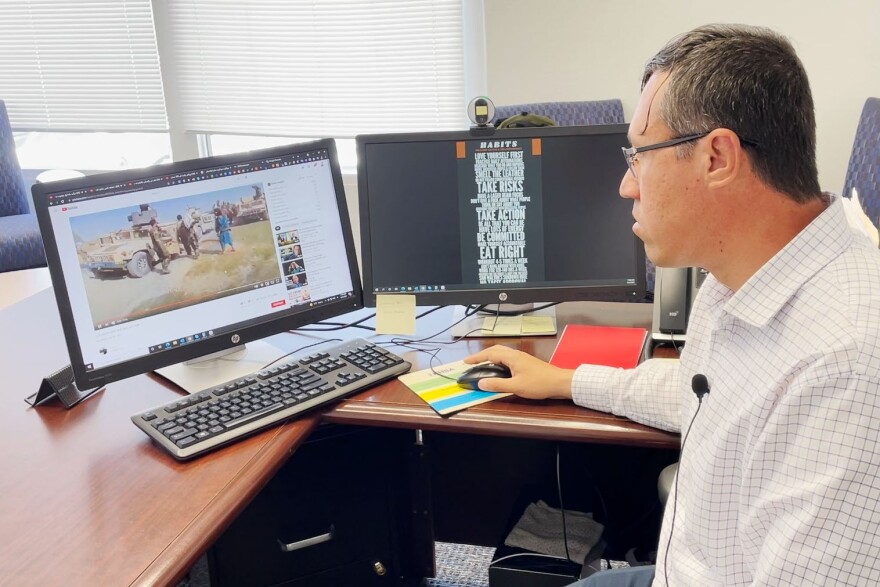Before coming to San Diego in 2017, Ali Rasouly worked as a translator for the U.S. Marine Special Operations Command outside Kabul — a risky job that made him a target of the Taliban.
Though he left that job to take a safer one as an accountant with an American contractor in Afghanistan, he still felt threatened.
“On two occasions, two people came to me and said I know you from somewhere,” he said.
Rasouly denied being an interpreter for American forces, but was approached a second time.
“That same night we moved. I quit my job and I called my employer and said I’m not going to work for this company,” he said. “Even that employer didn’t know that I used to work for the U.S.”
Now that the Biden Administration is planning to withdraw troops from Afghanistan, Rasouly says he feels betrayed. He is Harari, one of the minority groups that is often targeted.
He still has family in Afghanistan. Now every day, he watches YouTube videos of the Taliban driving unopposed into Afghan cities as American forces prepare to leave.
“It doesn’t make sense to me at all," Rasouly said. "Absolutely, this is wrong. They shouldn’t leave the country until we have a rational peace at least."
Rasouly was allowed to come to the U.S. through the Special Immigrant Visa program — visas set aside for people who worked with the U.S. government. But there's a backlog of roughly 18,000 other SIV applicants in Afghanistan, not including their families. They fear retribution because they worked with Americans.
Noah Coburn, a political anthropologist at Bennington College, has studied the SIV program, including interviewing dozens of former translators. He said the U.S. depends on local contractors in Afghanistan, but has never really had a plan to handle the fallout when their lives are threatened.
“That’s very much a part of the way the U.S. views these global entanglements,” he said. “Trying to keep them temporary. Trying to keep them economical but not thinking through what some of the longer term repercussions of them are.”
The U.S. doesn’t even keep a database of the people who work for them, forcing former contractors to carry binders filled with letters from former employers and military officials to prove they worked for the Americans.
With American troops on the verge of pulling out, Coburn said there is real potential for people to be slaughtered - especially members of minority groups who backed the U.S.
The Biden Administration said it will try to evacuate the Afghans to a third country while they await their U.S. visas.
Aside from the 18,000 SIV applicants, Coburn said there likely are other people who qualify for the program, but never applied because the process is so slow.
“If I've got the Taliban threat that is really imminent, I'm going to be not applying for this," Coburn said. "I've interviewed several people who have foregone the application process because it's a waste of time and waste of money for them."
The Afghan community in San Diego is small compared to other groups who have come in recent years, including Iraqis and Syrians. After the U.S. pulled out of Vietnam in 1975, it took more than 100,000 South Vietnamese to Guam for processing, The San Diego area took in thousands of refugees, who were initially housed in aging barracks at Marine Corps Base Camp Pendleton.
Armaghan Kakar was a medical interpreter for the American military in Kabul, before he came to the U.S. in 2014. He now works with Jewish Family Services in San Diego, counseling other immigrants from Afghanistan.
“Before they are coming here they are thinking that when I go, everything will be easy for me in America, but the first year is difficult for them,” he said.
Still, coming to the U.S. is worth it, he said. Back in Afghanistan, working with the Americans was nearly the only option for thousands of Afghans. But for many, that option ended when they were threatened by the Taliban.
“In general they are saying the situation is not getting better right now," Kakar said. "The only way is if peace comes to Afghanistan that will be a solution."
Under the Special Immigrant Visa program, people with the resources can get on a plane and travel to the U.S. once they are approved.
“Sometimes we have walk-ins. People who just come here on their own,” said Etleva Bejko, the director of Refugee & Immigration Services for Jewish Family Service of San Diego.
But at the moment, almost no Afghans are coming into San Diego. The visa process, designed to take nine months, could take two to four years under the Trump Administration. A 2020 State Department Inspector General's report concluded the backlog was caused in large part by of lack of staffing.
More recently, COVID-19 also slowed the process.
In the U.S., groups who resettle Afghans fear time is running out.
This story was produced by the American Homefront Project, a public media collaboration that reports on American military life and veterans. Funding comes from the Corporation for Public Broadcasting.
Copyright 2021 North Carolina Public Radio – WUNC. To see more, visit .



